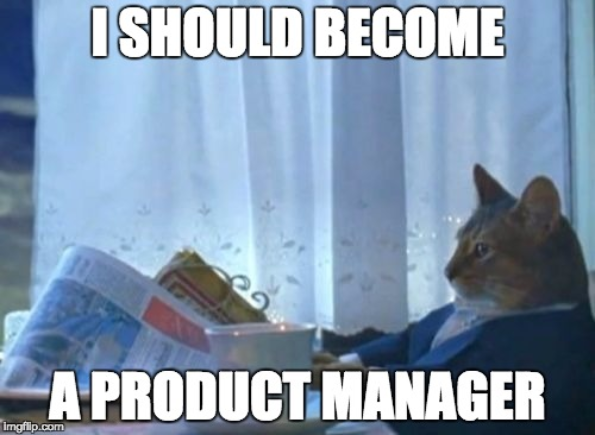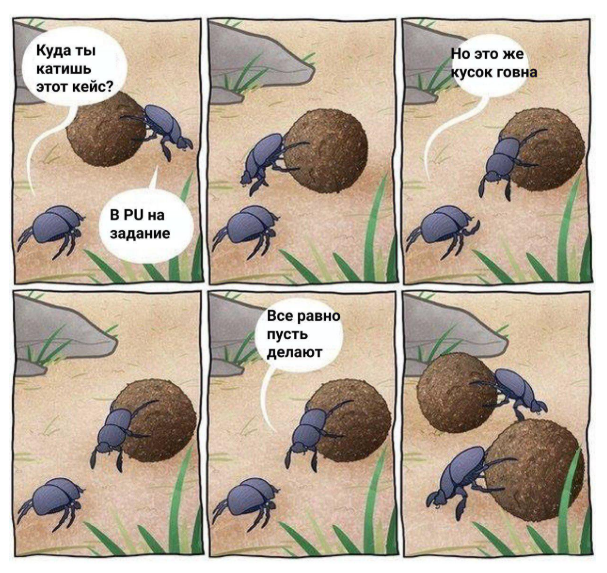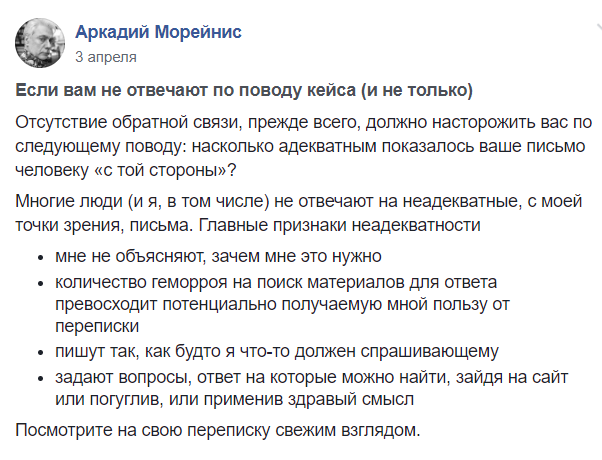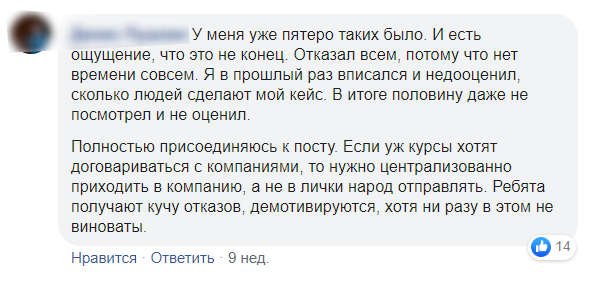I am from Moreynis. Oblique views or respect?
Below is my subjective opinion on the process and results of training on the sensational (in narrow circles) Product University. Honest review a month after the training.

What we were promised
Having tried myself in web development, testing and managing a small product, I realized that somewhere between a manager, a web analyst and a marketer, I need to dig deeper. Therefore, seeing the picture described by the creators of PU, I was inspired by the opportunity to feel like a product.
')
Advertise this course met many where. In the blogs of the founders themselves, in various grocery chatik and telegraph channels and many more where. I also received personal recommendations from my friends and I decided. Attempt is not torture.
I applied for the “Product Management” program, but I was offered to go through “Product Sales”, or choose a paid training option, which is provided, for example, if your current employer pays for you. Having studied the program in both directions, I saw that the first half of the training is completely the same, there is a product analytics provided, but for the b2b-sales skill, it will just help me to get the soft skills. And I decided.
We were kept in tight frames. After the start, we were offered daily tasks and take them on deadlines, 24 hours to complete the task. There were no benefits - weekends, trips, holidays, illness. We must find 1-2 hours a day or undergo paid training. I was spinning as I could, I even had to choose a plane instead of a train, because the trip took longer than a day and I could not keep the deadline.

As for the training itself, every day a small theoretical background is given in the form of text or a short video (which is publicly available) and a practical case study case study on which you work during the sprint. It took me more than 1-2 hours to study, since I had to study the theory myself. But it was not this that confused me.
For us there was no control and verification. Whoever understood the task, he did it. And you will never know whether you were moving in the right direction, unless a sympathetic fellow student with a weighty amount of experience did not give you an honest feedback. In the chat rooms, battles flared up over the interpretation of the wording of the tasks, I tried my friends, but I did not find the right answer to whether I thought and acted correctly.
It would also be very interesting to learn how the calculations and theoretical views on projects for the portfolio correspond to the truth. That is, what the project turns out to be in practice and whether it will bring the claimed 100,000 r, or will not get out of 0. But we are not destined to find out. We either worked on a virtual case, or on a real one, which the companies gave to “and so it will come down”.

In the second half of the training, we began to break up into mini-groups and work through tasks in them. On the one hand, I was able to pump my soft skills and convince myself of what I almost believed myself, namely, in my ideal calculations. On the other hand, calling up people who, like me, are looking for this unfortunate watch in their busy schedule is not the most pleasant pleasure. I was lucky that at work everyone reacted positively to the fact that I started “in the middle of the day“ pushing someone to the casino and buying dentures for my hospital ”.
I repeat that this is only my subjective opinion on the entire training program, supported by some reviews in self-organized educational sessions.
Training at Product University is cool, meaningful and status. But only up to that time, until we were told “look for cases from real employers”. At this moment, the product managers of many “tasty” IT companies, such as SkyEng, Mail.ru, Yandex, and others, were overwhelmed with offers from green inexperienced children who hope to get into the company without experience. It is quite logical that when he writes 10 people a day with the phrases “Hello. I'm from PU! Give me the case and I will do it for free ”, not the best opinion about students begins to take shape.

Therefore, if at first everyone looked at you with admiring glances, believing that you were good and you can be proud of your “origin”, then at one major conference, when several products came together and I had the imprudence to ask how they relate to Product University, they discreetly expressed everything that they think about it.
My expectations were not met. Knowledge is superficial, cases are unfinished, employers are not loyal. They gave me information about what the product can do and what it needs to know, but I couldn’t understand how successful / failing my work was due to the lack of feedback.
There is a positive side. Having learned to practice anytime, anywhere, I keep this pace to this day. Every day I can highlight and highlight a few hours for self-study. Besides, “what” to dig - I know.
I sincerely hope that the organizers will take these wishes into account and, above all, add this incredibly welcome feedback!

What we were promised
Having tried myself in web development, testing and managing a small product, I realized that somewhere between a manager, a web analyst and a marketer, I need to dig deeper. Therefore, seeing the picture described by the creators of PU, I was inspired by the opportunity to feel like a product.
')
- A short way to new work. The opportunity to learn and demonstrate their skills and ability to learn, so appreciated today by potential employers who promise to watch us right while learning on the online platform.
- Free preparation with payment after employment. The opportunity to get on the "free" training, which will have to pay only after employment or promotion. The cost is 50% of the first salary.
- 8 weeks online without interruption from work. Daily training, which would take 1-2 hours a day and would allow to combine with current work or study.
- Portfolio preparation. Opportunity within the framework of training to carry out several projects and to make a portfolio of them, demonstrating our knowledge.
Advertise this course met many where. In the blogs of the founders themselves, in various grocery chatik and telegraph channels and many more where. I also received personal recommendations from my friends and I decided. Attempt is not torture.
How we studied
I applied for the “Product Management” program, but I was offered to go through “Product Sales”, or choose a paid training option, which is provided, for example, if your current employer pays for you. Having studied the program in both directions, I saw that the first half of the training is completely the same, there is a product analytics provided, but for the b2b-sales skill, it will just help me to get the soft skills. And I decided.
We were kept in tight frames. After the start, we were offered daily tasks and take them on deadlines, 24 hours to complete the task. There were no benefits - weekends, trips, holidays, illness. We must find 1-2 hours a day or undergo paid training. I was spinning as I could, I even had to choose a plane instead of a train, because the trip took longer than a day and I could not keep the deadline.

As for the training itself, every day a small theoretical background is given in the form of text or a short video (which is publicly available) and a practical case study case study on which you work during the sprint. It took me more than 1-2 hours to study, since I had to study the theory myself. But it was not this that confused me.
For us there was no control and verification. Whoever understood the task, he did it. And you will never know whether you were moving in the right direction, unless a sympathetic fellow student with a weighty amount of experience did not give you an honest feedback. In the chat rooms, battles flared up over the interpretation of the wording of the tasks, I tried my friends, but I did not find the right answer to whether I thought and acted correctly.
It would also be very interesting to learn how the calculations and theoretical views on projects for the portfolio correspond to the truth. That is, what the project turns out to be in practice and whether it will bring the claimed 100,000 r, or will not get out of 0. But we are not destined to find out. We either worked on a virtual case, or on a real one, which the companies gave to “and so it will come down”.

In the second half of the training, we began to break up into mini-groups and work through tasks in them. On the one hand, I was able to pump my soft skills and convince myself of what I almost believed myself, namely, in my ideal calculations. On the other hand, calling up people who, like me, are looking for this unfortunate watch in their busy schedule is not the most pleasant pleasure. I was lucky that at work everyone reacted positively to the fact that I started “in the middle of the day“ pushing someone to the casino and buying dentures for my hospital ”.
What we got
I repeat that this is only my subjective opinion on the entire training program, supported by some reviews in self-organized educational sessions.
- A short way to new work. It seems that employers really were there and did offer some specialists. Only here it is not for beginners who have practically no experience in this field, but for those who are a bit jaded with “experience in sales - 5 years and 3 years in marketing”. It is likely that they would have found a job without this training.
- Free preparation with payment after employment. It all depends on you. If you daily find the opportunity to perform tasks, you will not take off from training. If you do not find it, then after signing the contract you are in any case obliged to fulfill the conditions. That is, it does not matter whether you took the knowledge and the possibilities or not. You have all the conditions provided and the rules of the game prescribed.
- 8 weeks online without interruption from work. I studied at night, in the afternoon, on the train, on the plane, at the conference, on the street and many more where and how. This is like the third job for which you will have to pay, you will find training materials on the Internet, and the feedback will come from the same guys as you.
- Portfolio preparation. I admit, we guessed that in 8 weeks to make 4 projects, spending on it 1-2 hours a day ... Well, that’s it. Projects are unrealistic, not confirmed by any data and in practice not verifiable. Such a portfolio for employers says nothing and does not carry. But for being forced to make a business card site, thank you. Without them, I put it off for a long time.
What employers say
Training at Product University is cool, meaningful and status. But only up to that time, until we were told “look for cases from real employers”. At this moment, the product managers of many “tasty” IT companies, such as SkyEng, Mail.ru, Yandex, and others, were overwhelmed with offers from green inexperienced children who hope to get into the company without experience. It is quite logical that when he writes 10 people a day with the phrases “Hello. I'm from PU! Give me the case and I will do it for free ”, not the best opinion about students begins to take shape.

Therefore, if at first everyone looked at you with admiring glances, believing that you were good and you can be proud of your “origin”, then at one major conference, when several products came together and I had the imprudence to ask how they relate to Product University, they discreetly expressed everything that they think about it.
Here are examples of negative reviews.



















In contrast, many remained supportive.





Total
My expectations were not met. Knowledge is superficial, cases are unfinished, employers are not loyal. They gave me information about what the product can do and what it needs to know, but I couldn’t understand how successful / failing my work was due to the lack of feedback.
There is a positive side. Having learned to practice anytime, anywhere, I keep this pace to this day. Every day I can highlight and highlight a few hours for self-study. Besides, “what” to dig - I know.
I sincerely hope that the organizers will take these wishes into account and, above all, add this incredibly welcome feedback!
Source: https://habr.com/ru/post/453732/
All Articles